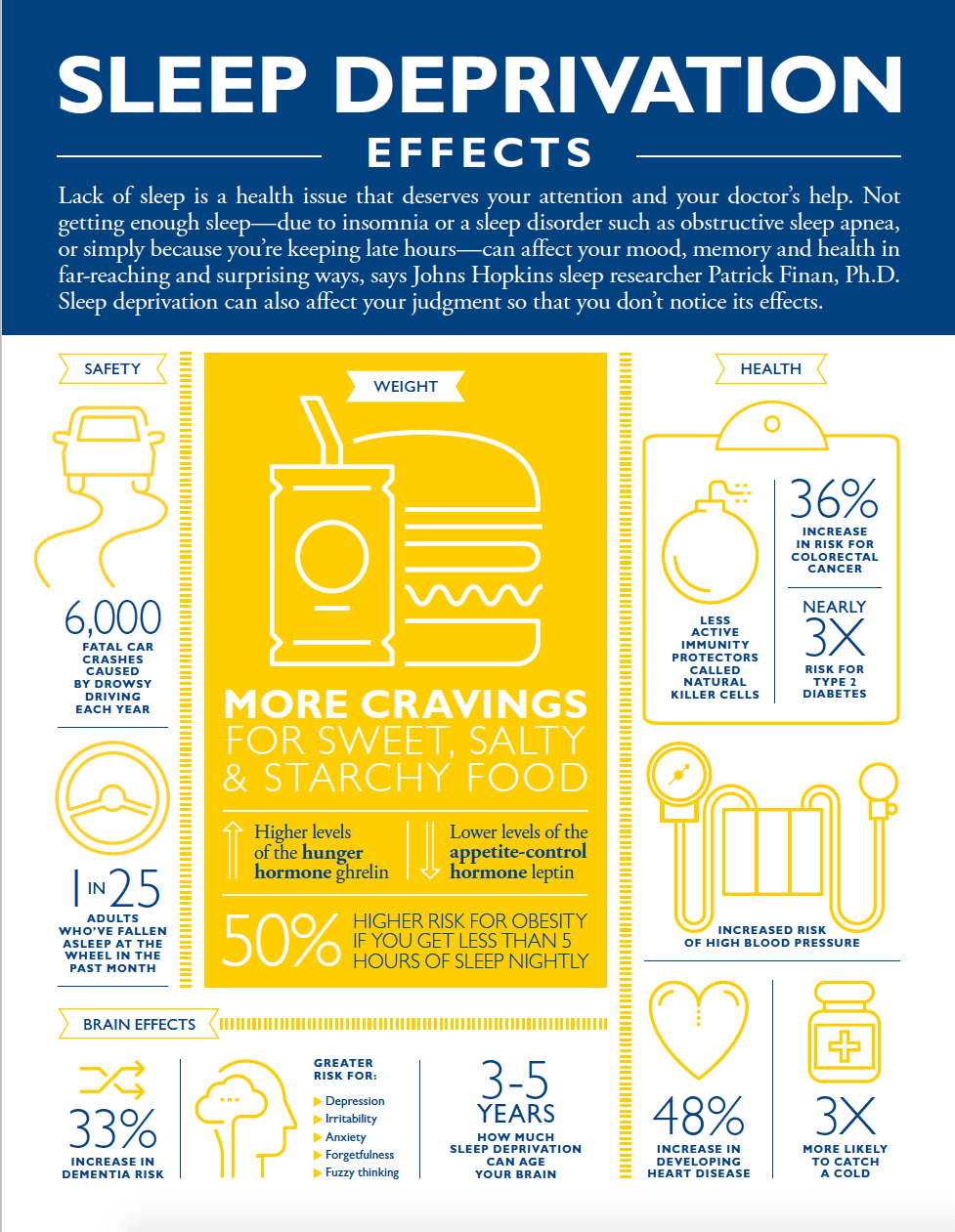A version of this post appeared on the Hub.
Sleep is a key building block of overall wellness. It’s nearly impossible to perform at your physical or mental peak if you aren’t getting consistent, restful sleep. Johns Hopkins School of Medicine Associate Professor of Psychiatry and Behavioral Sciences Patrick Finan, Ph.D. created the following infographic, detailing how sleep deprivation can affect mood, memory, health, and even your judgment.
It can be easy to fall into bad habits. Review these sleep hygiene tips, created in conjunction with the Office of Primary Care to make sure you’re getting the rest that you need.
- Prioritize sleep as an essential part of your schedule. Remember that rest does not inhibit your productivity; in fact, it improves it.
- Wake up at the same time every day.
- Don’t try to force sleep. If you can’t fall asleep after 20 minutes, get out of bed, go to another room, and return to bed only when you are truly sleepy. Repeat as needed throughout the night.
- Use your bed only for sleep (and sex). Avoid watching TV, using mobile devices*, reading, or eating in bed.
- A light snack prior to bed may promote sleep, but avoid going to bed while hungry or heavy meals close to bedtime.
- Limit naps to 20 minutes total per day.
- Limit caffeinated beverages to two servings per day, and avoid them entirely after noon.
- Avoid nicotine, as it is a stimulant, especially near bedtime and if you wake up during the night.
- Avoid excessive alcohol intake, and avoiding drinking late in the evening to make yourself sleepy. Even if you do fall asleep initially, alcohol can cause awakening later in the night.
- Avoid vigorous exercise within three to four hours of bedtime.
- Minimize noise, light, and excessive temperatures during your sleep period. Move lighted alarm clocks away from bed.
- Consider using a white noise machine while sleeping.
- Lavender, in the form of lotion or essential oils, can promote sleep.
- Avoid light-emitting devices for 30 minutes prior to bed, as they can suppress melatonin and disturb Circadian rhythms.
- Sleep as long as necessary to feel rested (usually seven to eight hours for adults) and then get out of bed.
- Focus on yourself and your needs, and be confident in the effectiveness of good sleep hygiene. Avoid engaging in competitive complaining with people who have different approaches to rest and wellness.
*We’ll make one exception to this rule: briefly using your device to queue up a Sleep Story or other relaxing content from the Calm app, which is free to Johns Hopkins affiliates. Access it here. Also if it’s within 30 minutes of your bedtime, turn off the device on which you are reading this sentence and start winding down, because you need and deserve a good night’s sleep.
Categories
- Environmental (46)
- Financial (49)
- Mental (182)
- Physical (252)
- Professional (151)
- Sexual (68)
- Social (149)
- Spiritual (21)
Archives
- April 2024
- March 2024
- February 2024
- January 2024
- December 2023
- November 2023
- October 2023
- September 2023
- August 2023
- June 2023
- May 2023
- April 2023
- March 2023
- February 2023
- January 2023
- December 2022
- November 2022
- October 2022
- September 2022
- August 2022
- July 2022
- June 2022
- May 2022
- April 2022
- March 2022
- February 2022
- January 2022
- December 2021
- November 2021
- October 2021
- September 2021
- August 2021
- July 2021
- June 2021
- May 2021
- April 2021
- March 2021
- February 2021
- January 2021
- December 2020
- November 2020
- October 2020
- September 2020
- August 2020
- July 2020
- June 2020
